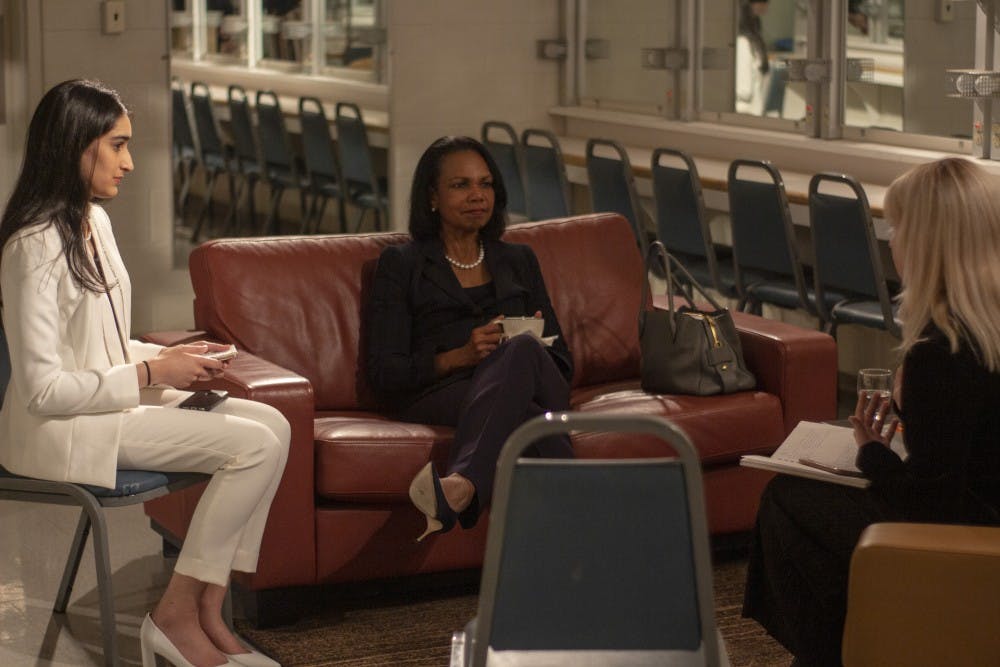Former Secretary of State Condoleezza Rice served as America’s highest-ranking diplomat under President George W. Bush’s administration, was the senior director of Soviet and East European Affairs in the National Security Council at the end of the Cold War and was the first African-American provost of Stanford University.
Rice sat down with The Spectrum ahead of her speech at Alumni Arena on Wednesday night to answer questions about representation and foreign relations.
Q: Recently there's been discussion within the black student community at UB concerning what they deem a lack of representation among faculty. As the first black provost of Stanford University, what issues have you faced in academia and what is your message to these students?
A: I do think it's disappointing that we have in almost every university, fewer, underrepresented minority faculty. But I would also say to them that somebody’s got to go and get a Ph.D. Not enough black students go on to do graduate degrees and then Ph.Ds and that is the pool from which faculty get hired. So I would really implore the black students to think about doing Ph.Ds. Think about academic careers and help us increase the pool of people who might be available to take those.
Q: As someone who started her career as a Soviet specialist, how do you see the current U.S.-Russia relations? Do you think we're headed towards renewed Cold War tensions, now with China in the mix and the recent Russian war games and military exercises?
A: Well, there's no doubt that we have seen great power rivalries come back. It's different because Russia is a declining power. Russia doesn't have much in the way of economic clout. But it is quite powerful in terms of its ability to use its oil and gas reserves to buy elections if they wish to. It's also a very strong military power still and throws its military weight around. China is a rising power. And so its economic capability gives it the ability to influence international politics in some ways that Russia can’t. But in terms of the U.S.-Russia relationship, it's kind of at a low point.
I don't think that President Putin has shown much interest in having a better relationship with the United States. I almost sense that he needs an enemy and it is us at this point because it becomes a way to rally his population. The economy is slowing in Russia, people are getting antsy and he is not as popular as he once was. And so his way of mobilizing and rallying people is to have an enemy, the United States, which he blames for the end of the Cold War, the way the war ended and encircling Russia, trying to keep Russia from being influential. He has a whole narrative that he tells. So it's kind of hard to see how you get a good working relationship with those circumstances. But we have to keep trying, because there's some issues that we can only solve with the Russians, like the Syrian war.
Q: What is your opinion on the recent arrest of Julian Assange who played a role in leaking the Iraq War documents as someone who was involved in national security?
A: I'm glad they arrested him. You don't get to make those decisions. The United States is a democracy, you can declassify documents. There's an entire procedure for doing that. It's called the FOIA. And people go and they make requests to declassify. Not that much is secret anymore anyway, because the press very often gets hold of things.
Q: Well, just as journalists, we have to FOIL for information pretty often. But with the recent administration, the number of requests that actually get completed has reduced drastically.
A: Well I think that FOIL requests need to be expeditiously processed. I suspect some of it is that they’re really understaffed. This administration, for the most part, hasn't been able to get people in place.
Q: You have often spoken highly of the value that immigrants hold to America. As someone who is a part of the Republican Party, how do you view the current immigration rhetoric within the Republican Party?
A: Well, I think you have to think about it, because it varies with some people actually being quite pro-immigration. I am solidly pro-immigration. I don't understand the conversation we're having about immigration. It makes no sense to the United States. Without immigration, we would have the same sclerotic demographics as Europe and Japan. We need the energy of immigrants. It is very often the case that immigrants come here without knowing the language and within a generation, their kids are college graduates.
I don't like the idea of merit-based immigration, I thought the idea was that people came here and they got better. And then they made us better. So from my point of view, whether somebody comes here to make $5, not 50 cents, or comes from those advanced countries in the world to help lead the knowledge-based revolution, they are adding to the value of America.
I believe like everyone that you have borders, you have to have laws, you can’t just have people crossing the border. But we also have to do something about the 10 to 12 million people living in the shadows. We are not a country that's going to deport 12 million people. We're not going to do it. “We the people” is at its best, when inclusive. And immigrants have made us better.
Q: As someone who came really close to brokering a peace deal between Israel and Palestine how do you think political rhetoric has changed surrounding this considering Rep. Ilhan Omar’s recent comments and Donald Trump and Jeanine Pirro’s response?
A: Well, the rhetoric, it's not great. But I am more concerned that people seem to be losing faith in the two-state solution. I don't think there is any other answer. Because if there's going to be a Jewish democratic state of Israel, there's going to have to be a democratic state of Palestine. I remember when Ariel Sharon, very conservative prime minister, said ‘I have no desire to rule over Palestinians.’ He was right. And so we try. I still think it's the only solution.
The Palestinians need to do some work on their own leadership. I liked Mahmoud Abbas very, very much. But they need new leadership. They need younger leadership, they need leadership that isn't associated with years and years of problems. And so there's work to do on both sides. But I do think the Arab leaders may be ready for a solution in ways that they weren't before because they're more concerned about Iran than they are about Israel. So maybe there’ll be an opening again.
Isabella Nurt is a junior film production major. She is keen to get off campus and cover underground topics in the greater Buffalo area.

Tanveen Vohra is a former senior news editor and covered international relations and graduate student protests.






